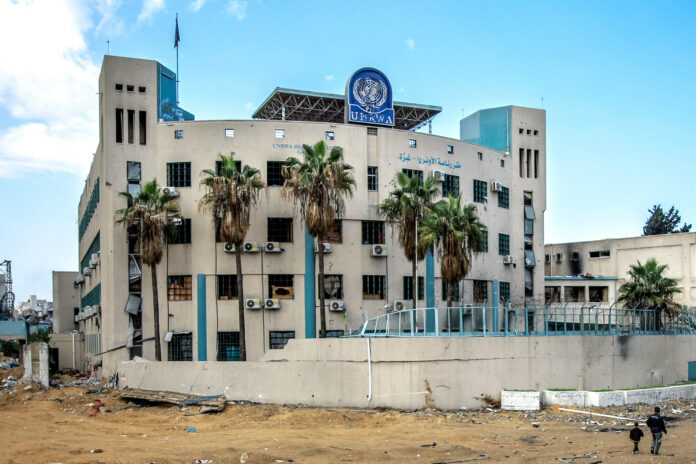There are countless unknowns and intangibles around what the Middle East will look like once the Israel-Hamas war ends: Who will control security and the civil administration in Gaza? Will borders be adjusted for Israeli security? What role will moderate Arab nations play in the new landscape?
But there is one very tangible outcome that will define success after this tragic war is over: UNRWA must be abolished.
The United Nations Relief and Works Agency (UNRWA) was established in 1949, just after Israel’s independence, to provide aid to new Palestinian refugees, not just in Gaza but in Jordan, Lebanon, and across the Arab world. For the past 75 years, it has failed to help Palestinians build a stable future while actively perpetuating conflict. Recordings released this week provided further evidence of UNRWA workers’ participation in the October 7 attacks. It’s long past time for another entity to take over.
-/AFP via Getty Images
Start with the fact a refugee agency should be getting refugees off its rolls and reducing the number of people who need to be supported by the global community. If more refugees are coming onto the rolls year after year, that agency, by definition, is doing something very wrong.
Yet that’s what has happened with UNRWA.
When UNRWA was created, there were 700,000 refugees, defined by the newly-established group as those whose “normal place of residence was Palestine during the period 1 June 1946 to 15 May 1948 and who lost both home and means of livelihood as a result of the 1948 conflict.”
In the ensuing years and decades, UNRWA’s definition of a refugee has expanded to include the children and grandchildren of those who were displaced. So, any Palestinian who refuses to accept repatriation anywhere other than Israel can remain a refugee and pass the status from generation to generation.
From 700,000 in 1948, today there are 5.9 million Palestinian refugees.
Inheriting refugee status is unique among the dozens of global refugee crises of the past century. In every other case—Vietnam, Syria, Venezuela—a separate UN agency called the High Commissioner for Refugees has sought to repatriate refugees. The goal was to create the conditions for families to reestablish themselves and give their children and grandchildren the opportunity for stability and prosperity.
For all their vitriol toward Israel over its treatment of Palestinians, the surrounding Arab nations have closed their borders to Palestinian refugees and refused to grant citizenship to the ones living within their borders. These include a half-million each in Syria and Lebanon, where they are not allowed to work most jobs and can’t receive any public assistance.
Instead, these governments relegate their Palestinian cousins to refugee camps for generations on end. They shrug off responsibility by pointing to UNRWA, believing that by trapping families in perpetual refugee status, they can provoke global anger toward Israel.
The notion that a different set of rules applies to only one people in the world is absurd. But that’s how UNRWA keeps its mission alive, its 30,000 workers on the job, and its billions of dollars flowing in from foreign governments.
To sustain the system, UNRWA also moved beyond the “humanitarian aid” business and into the education business. It operates hundreds of schools in Gaza and around the Arab world with curricula and textbooks that incite the next generation by dehumanizing Jews, denying Israel’s right to exist, and depicting all of the land between the Jordan River and the Mediterranean Sea as Palestine.
UNRWA also turned a blind eye (or worse) to the terrorism perpetrated by the Hamas government in Gaza.
Over the past few months, the world has learned that a number of UNRWA employees participated in Hamas’ Oct. 7 terror attack. These included a social worker who carried a murdered Israeli’s body into his car and drove the dead man into Gaza. And now the IDF released recordings of an UNRWA teacher saying he had captured an Israeli woman on October 7 as a “sabaya,” a Jihadi term for sex slave.
The IDF has also produced evidence that Hamas’ network of terror tunnels includes an elaborate command center built right underneath UNRWA’s Gaza headquarters.
UNRWA officials claimed they weren’t aware, but Western nations are skeptical. The United States and Germany, among others, have begun halting payments to the organization.
Now it’s time to take the next step.
Other humanitarian aid groups, forward-looking Arab nations, or even the UN High Commissioner for Refugees could step in to oversee the provision of aid to Palestinians with an eye toward enabling a more peaceful and prosperous future.
UNRWA has failed the people it’s supposed to help. It’s incited and protected terrorists. And now it’s lost the trust of its funders. After 75 years, it’s clear the agency will never play a role in ending Palestinian suffering—and even clearer that it needs to go.
Aviva Klompas is the former director of speechwriting at the Israeli Mission to the United Nations and co-founder of Boundless Israel, a nonprofit organization that partners with community leaders in the U.S. to support Israel education and combat hatred of Jews.
The views expressed in this article are the writer’s own.
Uncommon Knowledge
Newsweek is committed to challenging conventional wisdom and finding connections in the search for common ground.
Newsweek is committed to challenging conventional wisdom and finding connections in the search for common ground.


